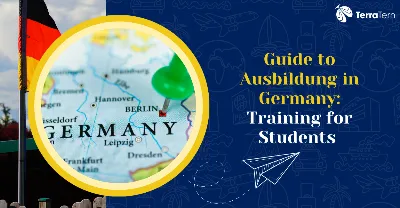Key Highlights
- What is Ausbildung in Germany? Understanding the Dual Education System in 2025
- Can Foreigners Do an Ausbildung in Germany? Latest Eligibility and Requirements
- What are the Current Types of Ausbildung in Germany? Choosing Your Career Path in 2025
- Current Nursing Ausbildung in Germany: Complete Healthcare Training Guide in 2025
- How to Apply for Ausbildung in Germany from India? Current Step-by-Step Process in 2025
- What are the Current Ausbildung Salary in Germany and Financial Benefits? Earning While Learning in 2025
- Current Top Companies and Institutions Offering Ausbildung Programs in 2025
- Life During Ausbildung: Current Student Experience and Support Systems
- Current Career Progression After Ausbildung: Building Your Future in Germany
- Kickstart Your Career with Germany’s Ausbildung: Earn, Learn, and Build Your Future in 2025!
- Conclusion
What is Ausbildung in Germany? The Ausbildung system in Germany is an exclusive dual system of education that integrates hands-on training (3-4 days per week) and theoretical training in vocational schools (1-2 days per week). In contrast to a conventional university, Ausbildung enables students to work during their studies, and salaries vary between 900 and 1300, depending on the discipline.
The program is 2-3.5 years, encompassing 350 or more recognised careers such as nursing, IT specialist, bank clerk, and mechatronics technician. International students are allowed to have a B1 degree in the German language and a secondary level qualification. This renders Ausbildung a convenient and viable avenue for working and residing in Germany.
What is Ausbildung in Germany? Understanding the Dual Education System in 2025

The Ausbildung in Germany program is set up to produce trained professionals who integrate both theory and practice. It does not follow the same path as university programs, as it equips students for the labor market.
Key Features of the Ausbildung in Germany System:
The highlights of the dual system are these:
-
Dual Structure: A Combination of classroom study and practical training.
-
350+ Professions: Covers healthcare, IT, banking, engineering, hospitality, and more.
-
Training: Salaries of between 900 and 1500/month.
-
Accepted Qualification: Certificates from Chambers of Commerce (IHK/HWK).
-
Employment Guarantee: 95% placement rate after completion.
How Does the Dual System Work in Practice in 2025?
The structure is simple:
-
Workplace Training – 3–4 days each week in a company.
-
Vocational School – 1–2 days a week, covering theory.
-
Block School Option – Some institutions follow a system where students spend several weeks at School and then several weeks at the company.
-
Examinations – Conducted by Chambers of Commerce and Industry, with written and practical parts.
This system ensures that students gain both academic knowledge and hands-on expertise.
Can Foreigners Do an Ausbildung in Germany? Latest Eligibility and Requirements
Can foreigners do Ausbildung in Germany? Yes, foreigners can do an Ausbildung in Germany. The program is open to international students, including those from India, provided they meet specific requirements.
Can foreigners do Ausbildung in Germany? Here is the basic eligibility criteria:
-
Completed secondary school education (Class 12 or equivalent).
-
Minimum B1 German language proficiency (B2 preferred).
-
Age preferably between 18 and 35 years.
-
Health insurance coverage.
-
Proof of financial means (only required until the training contract is signed).
Also Read: Germany EU Blue Card Visa
Current Visa Requirements for International Students
Non-EU applicants have to submit an Ausbildung Visa to begin Ausbildung in Germany. This visa will enable the students to spend time in Germany doing the training.
Required Documents:
-
Valid passport.
-
Signed Ausbildung training contract.
-
Proof of German language proficiency (B1/B2).
-
Authenticated school certificates.
-
Health insurance.
-
Proof of accommodation.
-
Bank statement/ blocked account (where required until stipend commencement).
Application Process:
-
Apply at the German Embassy/Consulate in your home country.
-
Submit documents with translations.
-
Wait for approval (processing time: 6–12 weeks).
Latest German Language Requirements: B1 vs B2 Level
The language requirements for Ausbildung in Germany are:
-
B1 Level: This is the minimum German language requirement for visa approval and entry into most Ausbildung programs. It ensures you can handle basic communication and training in daily life.
-
B2 Level: Preferred by employers, especially in nursing, healthcare, and technical fields. A higher level of proficiency increases your chances of selection, smooth integration, and better career growth.
-
Preparation Options: You can prepare through the Goethe-Institut, TestDaF, or Telc exams. Many students join online courses or language schools in their home country before applying.
What are the Current Types of Ausbildung in Germany? Choosing Your Career Path in 2025
Ausbildung in Germany is available in two primary forms, and the type of Ausbildung chosen depends on career objectives, competency, and interests. These two are both structured training modules, although they vary in scope, length, and opportunities for the future. Awareness of these kinds will aid you in making decisions concerning your career.
Also Read: Germany Ausbildung Program
1. Duale Ausbildung (Dual Training)
A combination of workplace training and school education.
-
Most common type.
-
Offers a monthly salary.
2. Schulische Ausbildung (School-Based Training)
It was entirely carried out in vocational schools.
-
More common in healthcare, nursing, or social services.
-
Frequently, no payment, although occasionally stipended.
Most In-Demand Ausbildung Fields in 2025
Germany is also experiencing high demands for skilled labour, and some of the Ausbildung areas in Germany are particularly appealing to international students. One of these areas can ensure more employment stability and a long-term career:
-
IT Specialist – Cybersecurity, software development, and systems integration.
-
Nursing and Healthcare - General nursing, geriatric care, and specialised medical assistance.
-
Engineering Mechatronics- Mechanical, electrical, and automotive engineering.
-
Business Administration – Banking, finance, office management, and logistics.
-
Renewable Energy – Solar, wind, and sustainable energy solutions.
-
Digital Marketing – SEO, content strategy, and social media management.
Latest Dual vs School-Based Ausbildung: Which to Choose?
When planning your Ausbildung, deciding between the two training models is essential. Each has its own advantages depending on your career goals and preferred learning style:
-
Dual Ausbildung: Paid training is highly popular and often leads to faster employment after completion.
-
School-Based Ausbildung: Usually unpaid, but the preferred option for fields like healthcare, social work, and education.
Current Nursing Ausbildung in Germany: Complete Healthcare Training Guide in 2025
Nursing Ausbildung in Germany is one of the most in-demand and respected fields, offering excellent job security, career growth, and opportunities to work in hospitals, elderly care, and specialised medical services.
3-Year Nursing Program Structure and Curriculum in 2025
Nursing Ausbildung in Germany was created to integrate classroom education with practical training in hospitals, and provide students with practical training and well-developed theoretical education. The program is usually designed in the following way:
-
Year 1: Basic nursing, anatomy, hygiene, and patient support, emphasising developing empathy and basic medical skills.
-
Year 2: Advocacy with enhanced knowledge of the medical field, emergency treatment, and experience in specialised healthcare departments.
-
Year 3 Advanced Specialisation: The students are prepared to work independently in paediatrics, geriatrics, surgery, or intensive care nursing.
Latest Monthly Stipends and Career Prospects for Nurses
Financial and career stability is one of the most significant benefits of studying nursing Ausbildung. Students receive wages as they research, and the employment opportunities in the country are essential as the country is on the path of a growing need for healthcare employees.
-
Stipend (2025 rates): 1,341-1,503 monthly, based on the region and employer.
-
Post-Graduation Salary: Ranges between €2,800 and €3,800 per month, with higher earnings possible after specialisation or experience.
-
Job Opportunities: High demand in hospitals, elderly care homes, rehabilitation centres, and private clinics across Germany.
-
Residency Pathway: Employment and successful completion are straightforward ways to attain permanent residency and long-term settlement in Germany.
How to Apply for Ausbildung in Germany from India? Current Step-by-Step Process in 2025

What are the kinds of Ausbildung in Germany? Applying for Ausbildung requires careful planning.
Step-by-Step Guide
-
Research Professions – Identify the field you are interested in.
-
Check Requirements – Confirm eligibility and language level.
-
Search for Vacancies – Use official job portals.
-
Prepare Documents – Translate and authenticate certificates.
-
Apply to Companies – Send applications directly.
-
Receive Contract – If selected, sign the training agreement.
-
Apply for a Visa – Submit documents to the German Embassy.
-
Travel to Germany – Begin your Ausbildung.
Finding Ausbildung Positions: Top Websites and Resources in 2025
What are the kinds of Ausbildung in Germany? The first step towards developing a career in Germany is to achieve the proper Ausbildung position. There are some trustworthy online platforms and company portals where international students can search through opportunities of Ausbildung regularly:
-
Make-it-in-Germany: The official government portal offers guidance and job listings to international applicants.
-
Bundesagentur für Arbeit: The portal of the Federal Employment Agency in Germany has thousands of Ausbildung vacancies.
-
Azubiyo: A specialised portal for Ausbildung and internships, with career-matching tools for students.
-
Company-Specific Websites: Large companies like Siemens, SAP, and Deutsche Bank post Ausbildung programs directly on their career pages.
Latest Document Preparation and Authentication
What are the kinds of Ausbildung in Germany? To apply to Ausbildung, it is necessary to prepare appropriate documents, and international students must ensure that their papers meet the German standards. It has to be translated correctly and legalised before submission:
-
Certificates: Every educational and professional certificate should be translated into German to be used officially.
-
Certified Translators: Government-approved or sworn translators are the only ones to use to prevent rejection.
-
Legalisation or Apostille: Documents must be legalised or apostilled in your home country and cannot be accepted in Germany.
What are the Current Ausbildung Salary in Germany and Financial Benefits? Earning While Learning in 2025
One of the most significant advantages of Ausbildung in Germany is the financial benefit, as students can earn a monthly stipend while receiving free vocational training. This “earn while you learn” model reduces financial stress and allows international students to gain practical work experience and become financially independent during their studies.
Monthly Stipend Ranges by Profession in 2025
How much you make whilst doing Ausbildung is also determined by the type of field you pursue and the firm providing the training. Stipends grow annually in training, aiding students to meet their day-to-day expenses:
-
IT Specialist: €950–1,200 monthly, with higher pay in large tech companies.
-
Nursing: €1,341–1,503 per month (2025 figures), among the highest-paying Ausbildung fields.
-
Banking: €980–1,300 per month, with additional perks in private banks.
-
Engineering: Between 900 and 1350 euros monthly, by specialisation and location.
Also Read: Germany Student Visa
Latest Cost of Living vs Earnings Analysis
Although stipends cover much of the living costs, the students should budget properly. The cost of living in Germany differs depending on the city, yet a lot of Ausbildung trainees can afford it on their stipend:
-
Mean Cost of Living: €900 -1,100/month (Depending on place of residence, e.g., more in cities such as Munich, less in small towns).
-
Significant Expenses: The most significant expenses are Rent, food, transportation, and mandatory health insurance.
-
Economical Living: The Shared people live, undergraduate dormitories, or company-sponsored housing will decrease the monthly costs.
Current Top Companies and Institutions Offering Ausbildung Programs in 2025

Germany is home to numerous world-renowned corporations and trusted institutions that actively run Ausbildung programs for international students. These organisations provide high-quality training and strong career prospects, making them ideal starting points for a successful professional journey.
Healthcare Institutions for Nursing Ausbildung in 2025
The healthcare industry of Germany is experiencing an increased need for qualified professionals, and hospitals and welfare agencies are among the most prominent training institutions in nursing Ausbildung.
-
Charité Berlin: It is one of the largest university hospitals in Europe and provides in-depth training and practical experience in various fields of medicine.
-
University Hospital Heidelberg: This hospital is famous for research and innovations and offers modern nursing training and clinical experience to international students.
-
Klinikum Stuttgart: One of the most prominent hospital networks, Klinikum Stuttgart provides well-organised nursing courses in various fields.
-
Diakonie and Caritas organisations: Church institutions specialising in elderly care, community health, and social work education.
Latest Tech Companies Leading IT Ausbildung Programs
The tech sector in Germany is performing very well and has several Ausbildung opportunities in software, IT infrastructure, and digital services. Leading companies include:
-
SAP: Enterprise software developer based in the United States with Ausbildung in Information systems development and integration.
-
Siemens: Offers many IT, mechatronics, and automation technology programs.
-
Deutsche Bank: Runs Ausbildung programs in IT systems, cybersecurity, and digital finance solutions.
-
Bosch: Provides IT-related training as well as engineering and innovation-oriented training.
-
Lufthansa Systems: Specialises in aviation IT solutions, exposing trainees to international digital systems.
Life During Ausbildung: Current Student Experience and Support Systems
Living in Germany as an Azubi (trainee) offers both challenges and opportunities. From adapting to a new culture and language to managing finances and work-life balance, international students gain professional training and valuable life skills. To support them, Germany provides a strong network of student services, mentorship programs, and community organisations that help trainees integrate smoothly into society while enjoying a rewarding learning journey.
Accommodation Options for International Trainees in 2025
One of the initial steps to a successful Ausbildung experience is to find the proper place to live. There are several cheap and convenient flats in Germany available to foreign trainees:
-
Student Housing: Low-cost dorms offered by universities or college associations are usually within easy reach of training facilities.
-
Shared Apartments (WG): A commonly used one, where trainees share flats with other students or young professionals, saving money, thus making them socially connected.
-
Company-Provided Housing: It is common in healthcare workplaces and other companies that provide trainees with on-site or subsidised housing.
-
Private Rentals: They can be more expensive in major cities such as Munich or Frankfurt and are offered as independent apartments.
Latest Integration and Language Support Programs
Most companies and organisations offer structured support programs to ensure that international trainees can adjust to life in Germany. The following resources guarantee a smooth transition in the workplace and in social life:
-
Mentorship Programs: Seasoned employees train new trainees to get used to the working environment and local culture.
-
Additional German Language Lessons: These are lessons of an employer or a training centre aimed at improving their communication skills at a level higher than B1/B2.
-
Cultural Integration Workshops: The workshops expose the trainees to the German customs, traditions, and workplace etiquette.
-
Peer Support Networks: Groups of other international students and trainees who provide support, tips, and make them feel at home.
Current Career Progression After Ausbildung: Building Your Future in Germany
Completing an Ausbildung in Germany opens multiple career pathways, both within the country and abroad. Employers highly value graduates for their practical skills, hands-on training, and industry readiness. After finishing the program, trainees can continue working with their training company, pursue advanced studies, or specialise in their field. With high demand in healthcare, IT, and engineering sectors, Ausbildung graduates also enjoy strong chances of securing long-term employment and even permanent residency in Germany.
Also Read: Germany Visa for Education Recognition
Pathway to Permanent Residency and Citizenship in 2025
Completing an Ausbildung builds a strong career and paves the way for long-term settlement in Germany. The steps are straightforward and offer clear opportunities for international trainees.
-
After Ausbildung, secure a full-time job.
-
Apply for a residence permit extension.
-
After 2 years of employment, apply for permanent residency.
-
Citizenship is possible after 6–8 years of residence.
Latest Further Education and Specialisation Options
Graduates of Ausbildung are not limited to just entry-level positions. Several opportunities exist to continue education and gain advanced qualifications that improve career prospects.
-
Master Craftsman Certificate (Meister).
-
University education after Ausbildung.
-
Continuing professional certifications.
-
Specialised courses for career advancement.
Kickstart Your Career with Germany’s Ausbildung: Earn, Learn, and Build Your Future in 2025!

Ausbildung in Germany is a world-renowned dual vocational training system that combines theoretical classroom education with practical workplace experience. This comprehensive apprenticeship program offers international students the unique opportunity to:
-
Earn While Learning: Receive monthly stipends ranging from €900-1,500 throughout the 2-3.5 year program
-
Gain Guaranteed Employment: Achieve 95% job placement rates upon completion
-
Access 350+ Career Paths: Choose from diverse fields including nursing, IT, engineering, and business
-
Obtain Permanent Residency: Establish a pathway to long-term residence in Germany
-
Experience Debt-free Education: Train without tuition fees while building practical skills
This guide provides essential information for Indian students and international applicants seeking to launch successful careers through Germany's prestigious vocational training system in 2025.
Conclusion
A successful career in a foreign country is one of the best opportunities available to international students in Germany through an Ausbildung. It is a practical training with a financially independent option and is a direct road to a job and a permanent residence. Ausbildung in Germany 2025 is a game-changer that provides Indian and international students with a life-changing opportunity to pursue studies in Germany.
It has over 350 career options, no tuition, and monthly stipends. If you will apply, you should prepare your documents, work on your German, and find programs that suit your interests. Contact TerraTern for more information on Ausbildung in Germany!






